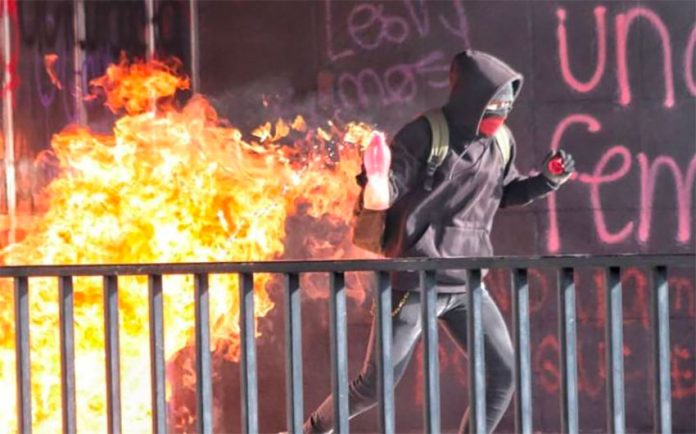A students’ strike at the National Autonomous University (UNAM) now enters its fourth month as unrest has spread throughout the public university system, in some cases leading to heated confrontations with administrators.
Protests to denounce gender violence and sexual assault by professors began on October 2. Since then students at 23 university colleges and preparatory schools under the UNAM umbrella have organized their own strikes to demand something be done, affecting over 161,000 students in all.
The two schools that have been closed the longest are the School of Philosophy and Letters, on strike since November 4, and the National Preparatory School 9, closed since November 12.
Female students at the preparatory school claim to have found glasses equipped with cameras with which their professors filmed them during gym and swimming classes.
Some protests have become violent, leading to vandalism and confrontation between students and administrators.

Students in hoods and masks protested outside the university’s main administrative offices on Tuesday, seeking to open a dialogue with school administrators. The protest turned violent when they were met by security personnel instead.
The students spray-painted graffiti on the building, broke glass doors and windows and set fire to the property.
“The rector’s council decided to stay in the back of the building and they don’t want to come to the door … We consider this a refusal to accept our demands, many of which have been sent without resolution,” said one protester.
The university responded in a statement saying that it “cannot accept in any case the mistreatment and aggression against its professors, nor against the students that do not share the methods of the masked people.”
It called the protests “open provocations” by violent groups and said that “there are large majorities [of students] who want to continue with their classes.”
After Tuesday’s protest became violent, UNAM attorney Mónica González Contró accepted a list of demands presented by the students of Preparatory School 9. Though they thanked her for doing so, the protesters complained that the university’s response to their demands had been insufficient.
President López Obrador appeared to dismiss the students’ claims of violence and sexual assault, saying he believed that the protests were being organized by a “black hand” and called them “a movement without a cause.”
He said that the current unrest is different from past situations, such as the student protests of 1968 that led to the Tlatelolco Massacre, because “we are living in times of liberty, justice, tolerance [and] the search for peace. These are new times because there is no authoritarianism, no corruption.”
The president called for the schools to reopen and for there to be dialogue between administrators and students.
Sources: El Universal (sp), Milenio (sp)
